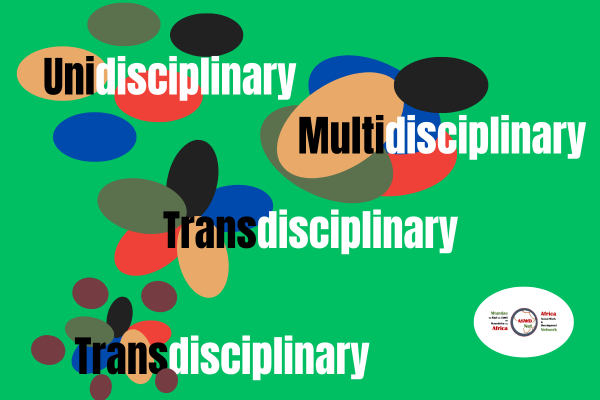
Unidisciplinary, multidisciplinary, interdisciplinary, and transdisciplinary approaches in social work and development
In social work and development, the challenges we face such as poverty, inequality, housing, environmental degradation, colonisation, displacement are deeply interconnected. No single profession or academic field can address these issues in isolation. Yet how we collaborate across knowledge areas matters. Terms like unidisciplinary, multidisciplinary, interdisciplinary, and transdisciplinary are often used interchangeably, but they represent very different ways of thinking and working. Understanding these distinctions is essential if we want to create more inclusive and effective responses.
Unidisciplinary work
Unidisciplinary practice stays within the boundaries of one field. A social worker developing a women security plan for a community using only social work theories and methods is working unidisciplinarily. This approach allows for depth and professional clarity, but it often falls short when dealing with complex social problems that are influenced by many factors such as economic, legal, psychological, and environmental. While unidisciplinary knowledge remains important, relying solely on it can limit our impact.
Multidisciplinary practice
In multidisciplinary work, several disciplines are involved, each contributing their own perspective to a shared issue. However, they typically work in parallel, not together. For example, in a community development project, a social worker might address family or village dynamics, a health worker tackles sanitation, and an economist evaluates income levels. Each professional works on their own component, and while their efforts may align, there is little integration of ideas. This approach brings different voices to the table, but the lack of collaboration can result in disconnected solutions.
Interdisciplinary collaboration
Interdisciplinary work involves actual integration. Professionals from different fields work together, learning from each other, combining methods, and shaping shared strategies. A social worker might collaborate closely with an urban planner to redesign a public space that improves both safety and social inclusion. Instead of separate interventions, the result is a single, coordinated response that draws on multiple sources of knowledge. This kind of collaboration requires time, openness, and the ability to speak across disciplinary languages, but it often leads to more thoughtful and lasting outcomes.
Transdisciplinary engagement
Transdisciplinary work moves beyond traditional boundaries, bringing together not only different academic and professional fields but also the knowledge and experience of communities themselves. In a transdisciplinary project, social workers might collaborate with researchers, policymakers, and local residents to co-design a response to food insecurity. Community knowledge is not just included but it is central. Transdisciplinary practice values lived experience, challenges hierarchies of knowledge, and encourages shared ownership of both the problem and the solution.
Why these differences matter
In social work and development, we often speak about participation, empowerment, and collaboration. But these values must also be reflected in how we generate knowledge and design interventions. Relying on unidisciplinary or even multidisciplinary approaches may be useful in certain contexts, but they often fall short in addressing root causes or building community ownership. Interdisciplinary and transdisciplinary approaches offer a way forward. They ask us to think relationally, to work more closely with others, and to value the insights of those whose voices are often left out.
As our work continues to intersect with education, public health, climate change, decolonisation, housing, and human rights, our methods must evolve too.
African social work, social development, and broader development practice
In African social work, social development, and broader development practice, how we approach knowledge and collaboration has real implications for how we respond to poverty (rural and urban poor), inequality (women and children), and exclusion (disabled, older members and farmers). Unidisciplinary methods may offer technical depth in areas such as counselling, policy drafting, or economic planning, but they often miss the historical and cultural roots of structural problems. Multidisciplinary work allows different professions to contribute to shared issues, but without real integration, it risks repeating colonial patterns of separation between sectors and knowledge systems. Interdisciplinary approaches make it possible to link strategies across education, health, governance, and social protection in ways that reflect the complexity of Africa’s Agenda 2063 and the Sustainable Development Goals. Transdisciplinary practice goes further by creating space for local knowledge, lived experience, and the leadership of communities themselves. This is where indigenisation and decolonisation move from theory into practice, particularly in relation to culture, language, education, and identity. Afrofuturism, when applied as a development lens, challenges us to imagine futures that are not shaped by imported models but by African knowledge, creativity, and aspirations. It connects with the idea of an African renaissance, as envisioned by thinkers like Thabo Mbeki, where the continent defines its own direction based on its people, histories, and possibilities.
Use the form below to subscibe to Owia Bulletin.
Discover more from Africa Social Work & Development Network | Mtandao waKazi zaJamii naMaendeleo waAfrika
Subscribe to get the latest posts sent to your email.



